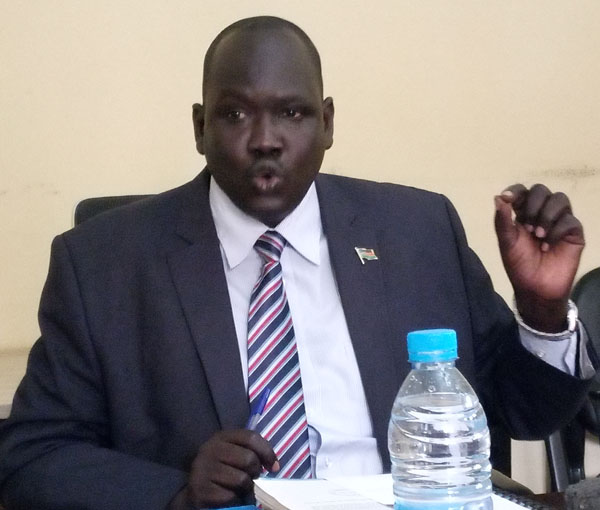
Elijah Alier, Managing Director of the Media Authority in South Sudan - courtesy
The national media regulator, the Media Authority has said it will start accreditation of all South Sudanese journalists beginning next week on Monday.
This is in line with sections 18/1 and 67 of the Media Authority Act which mandate the institution to register journalists in the country.
However, according to Media Authority, the process will exclude journalists from Radio Miraya over unresolved registration disputes with UNMISS.
To be accredited, the applicant must be a reporter, news writer or news editor, a photographer, or a filmmaker in a media organization or as a freelancer.
And they should at least obtain a certificate in journalism.
Elijah Alier who is the Managing Director of the Media Authority says the certification is not meant to restrict media freedom but rather professionalize the sector.
He spoke to reporters during a news conference in his office at Gumbo-sherikat on Wednesday.
“Since we do not know who the journalists are and everybody is a journalist, those who meet the requirements will be the only people that will be given accreditation,” said Elijah.
“The accreditation will not be for everybody, and the requirements are very clear as per the accreditation of journalists’ regulations. The minimum requirement is that you must have at least a certificate in journalism, and you should also have attended training in journalism,
“Other categories as you move up like the editor, editor-in-chief, and station managers, you should also meet certain requirements to be in that capacity,
“We are not trying to restrict the work of journalists but to streamline the work of journalists for this profession to be respected.”
The accreditation, according to Alier, will allow journalists to attend briefings and press conferences, access press releases by the government or public sector organizations as well as visit state and government officials.
However, it obliges journalists to adhere to the Code of Ethics for Journalists in South Sudan.
Meanwhile, the Media Authority says journalists working for the UN- sponsored Radio Miraya will not be accredited due to the suspension of the station five years ago.
In 2018, the media regulator suspended the operation of the Radio Miraya 101 FM, citing noncompliance and refusal to be regulated under the Media laws of South Sudan.
Radio Miraya has, however, continued to operate despite the suspension.
“Radio Miraya is not recognized by the Media Authority and their journalists have always turned away simply because they are not recognized by the media authority,” Elijah said.
“They [UN] are trying their level best to address the issue and come back to be recognized but as to when it will be okay, I don’t know,
“Unless we give them a recommendation…as long as you come with a recommendation from Radio Miraya, it will not be accepted for you to get accredited.”
For his part, Patrick Oyet, the President of the Union of Journalists in South Sudan (UJOSS), welcomes the accreditation exercise but says it should not be used to suppress press freedom.
“Accreditation from the Media Authority is going to be a good thing but the only concern we have is that it should not suppress the freedom of expression,” said Oyet.
“It should not come to a point too soon whereby if you don’t have the accreditation ID, you are not allowed to cover the event, which I think the media authority has clearly said will not be the case,
“It is a process, it is starting, and they will give enough time for people to get the accreditation so, I think it is okay,
“Since this is coming from the government, it is easier for journalists to show the ID to security whenever they ask for it and I think it will resolve the problem of identification,
“I think the intention is good. We will see how the implementation will go but the whole intention of introducing accreditation is a good one.”
According to the media freedom advocacy group, Reporters without Borders, press freedom is extremely precarious in South Sudan, with journalists said to be working under constant threat and intimidation.
In the annual global Press Freedom Index ranking published by Reporters without Borders this year, South Sudan ranked 128 out of 180 countries on the press freedom index in 2022.
Support Eye Radio, the first independent radio broadcaster of news, information & entertainment in South Sudan.
Make a monthly or a one off contribution.
Copyright 2024. All rights reserved. Eye Radio is a product of Eye Media Limited.